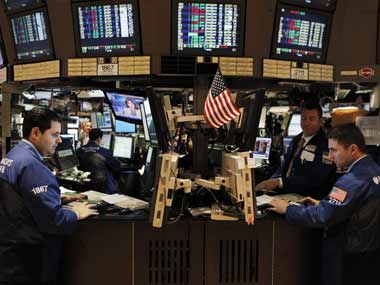New York: After a rough month for stocks, the Dow Jones Industrial Average staged a triple-digit advance on Monday as investors saw signs of a compromise in Washington on the impending fiscal cliff.
President Barack Obama, who is on a three-nation trip to Asia, took a moment in Bangkok to stoke the optimism. “I am confident we can get our fiscal situation dealt with,” the president said.
The Dow Jones industrial average rose 12,795.96 points, or 207.65 points to close at 1.65 percent.
If the US Congress is to reach a deal, it will need to do so soon. The tax increases and spending cuts that constitute the fiscal cliff go into effect on 1 January, if nothing is done. Economists have warned that if the Bush-era tax cuts expire, it could push the soft US economy back into recession.
Investors apparently were feeling better on Monday about the prospect of an agreement as they heard Republican and Democrat leaders making encouraging noises.
[caption id=“attachment_517082” align=“alignleft” width=“380”]  Wall Street is betting that the fiscal cliff will be averted. Reuters[/caption]
“To show our seriousness we put revenue on the table as long as it’s accompanied by significant spending cuts,” said House Speaker John Boehner, an Ohio Republican.
Both sides seem to be looking at the same roadmap. Republicans now concede that they will agree to increase tax revenues, and Democrats say they will agree to more spending cuts, but they are still divided over which route to take.
Despite conciliatory comments from both parties about avoiding the fiscal cliff, an actual deal remains elusive. Major disagreements centre on whether tax rates will rise for rich Americans. Obama has insisted that he wants rates for families making $250,000 or more to return to Clinton-era levels, which means they would go from 35 percent to 39.6 percent. Republicans are adamantly opposed to this.
You might think our Indian government takes the cake when it comes to policy paralysis, but the US Congress also has a penchant for getting stuck in astounding policy gridlock.
The last time the US Congress failed to come to a bipartisan agreement on raising the debt limit in August 2011 it endangered America’s credit rating. After the bitter fight in Congress over raising the debt limit in the summer of 2011, Standard & Poor’s downgraded the US government’s credit rating to AA+ from AAA.
Despite being the most expensive presidential contest in history, very little has changed in Congress after the elections. Obama remains president. The Republicans remain in control of the House of Representatives. The Democrats hold the Senate. In short, it’s a recipe for gridlock.
In other US economic news on Monday, sales of previously owned homes rose last month, beating expectations. Separately, the National Association of Home Builders said its home builders’ confidence index rose to its highest level in 6-1/2 years.
Meanwhile, the European markets rallied on speculation of US fiscal progress. The Stoxx Europe 600 climbed 2.2 percent, its biggest one-day rise in more than two months.


)
)
)
)
)
)
)
)
)



